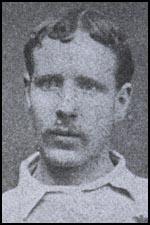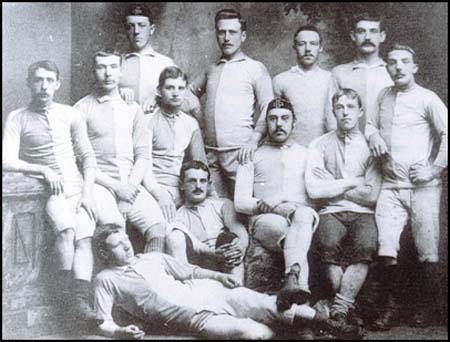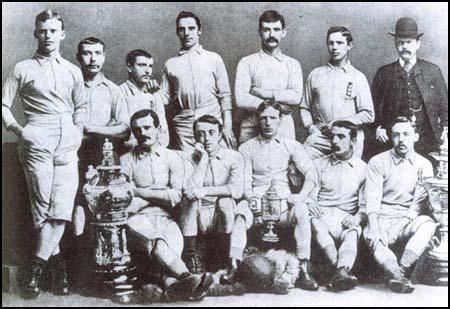Jimmy Brown

James (Jimmy) Brown was born in Blackburn on 31st July, 1862. On 5th November 1875, two friends, John Lewis and Arthur Constantine, organized a meeting at the St Leger Hotel in Blackburn to discuss the possibility of establishing a football club in the town. Seventeen men attended the meeting and it was decided to establish the Blackburn Rovers Football Club.
John Hargreaves and Fred Hargreaves, who both worked in the legal profession, became important figures at the club. They had both played football for Malvern College and advocated that Blackburn Rovers adopted the quartered shirt design of their school shirts. However, they suggested that the traditional green should be changed to the light blue worn by the Cambridge University football team.
Jimmy Brown was only seventeen when he started playing for Blackburn Rovers. Other players in the team included, John Hargreaves, Fred Hargreaves and Doctor Greenwood. In 1880 the club signed Hugh McIntyre, Fergie Suter and Jimmy Douglas from Scotland. This made them one of the best teams in England.
Jimmy Brown, who played at centre-forward, won his first international cap for England against Wales on 26th February, 1881. In his next game for his country he scored two goals in England's 13-0 victory over Ireland.
In 1882, Blackburn Rovers became the first provincial team to reach the final of the FA Cup. Their opponents was Old Etonians who had reached the final on five previous occasions. However, Blackburn had gone through the season unbeaten and was expected to become the first northern team to win win the game. Doctor Greenwood was injured the team included five players who had won international caps, Jimmy Brown, Jimmy Douglas, Fred Hargreaves, John Hargreaves, and Hugh McIntyre.
The Old Etonians scored after eight minutes and despite creating a great number of chances, Blackburn was unable to obtain an equalizer in the first-half. Early in the second-half George Avery was seriously injured and Blackburn Rovers was reduced to ten men. Despite good efforts by Jimmy Brown, Jack Hargreaves and John Duckworth, Rovers were unable to score.

back row: Doctor Greenwood, R. Howorth, John Hargreaves, Fergie Suter,
Middle row: John Duckworth, Hugh McIntyre, H. Sharples, Fred Hargreaves, Tot
Strachan, George Avery. Sitting on the floor: Jimmy Brown and Jimmy Douglas.
Blackburn Rovers also got to the 1884 FA Cup Final. Their opponents were Queens Park, the best team in Scotland. John Hargreaves played at inside right. The Scottish club scored the first goal but Blackburn Rovers won the game with goals from Blackburn lads, James Forrest and Joe Sowerbutts.
In January, 1884, Preston North End played the London side, Upton Park, in the FA Cup. After the game Upton Park complained to the Football Association that Preston was a professional, rather than an amateur team. Major William Sudell, the secretary/manager of Preston North End, admitted that his players were being paid but argued that this was common practice and did not breach regulations. However, the Football Association disagreed and expelled them from the competition.
Blackburn Rovers, who denied they were paying their players, beat Old Carthusians 5-0 in the semi-final of the FA Cup. Once again they had to play Queens Park in the final. Blackburn Rovers was now a team full of internationals. This included Jimmy Brown, James Forrest, Herbie Arthur, Joseph Lofthouse, Hugh McIntyre and Jimmy Douglas. A crowd in excess of 12,000 arrived at the Oval to see the what most people believed were the best two clubs in England and Scotland. With goals from Brown and Forrest, Blackburn Rovers won 2-0.

Cup that they won in 1883-84 season. Back row, left to right: Joseph Lofthouse,
Hugh McIntyre, Joe Beverley, Herbie Arthur, Fergie Suter, James Forrest,
Richard Birtwistle, Front row: Jimmy Douglas, Joe Sowerbutts, Jimmy Brown,
George Avery and John Hargreaves.
At the end of the 1883-84 season Preston North End joined forces with other clubs who were paying their players, such as Aston Villa and Sunderland. In October, 1884, these clubs threatened to form a break-away British Football Association. The Football Association responded by establishing a sub-committee, which included William Sudell, to look into this issue. On 20th July, 1885, the FA announced that it was "in the interests of Association Football, to legalise the employment of professional football players, but only under certain restrictions". Clubs were allowed to pay players provided that they had either been born or had lived for two years within a six-mile radius of the ground.
Blackburn Rovers immediately registered as a professional club. Their accounts show that they spent a total of £615 on the payment of wages during the 1885-86 season. Despite the fact that clubs could now openly pay their players, Blackburn Rovers continued to dominate English football. They reached the 1885 FA Cup Final by beating Darwen Old Wanders (6-1), Staveley (7-1), Brentwood (3-1) and Swifts (2-1) Seven of the Blackburn Rovers team were appearing in their third successive final, whereas Jimmy Brown, Fergie Suter, Hugh McIntyre and Jimmy Douglas were playing in their fourth final in five season. The game against West Bromwich Albion at the Oval ended in a 0-0 draw.
The replay took place at the Racecourse Ground, Derby. A goal by Joe Sowerbutts gave Blackburn Rovers an early lead. In the second-half Jimmy Brown collected the ball in his own area, took the ball past several WBA players, ran the length of the field and scored one of the best goals scored in a FA Cup Final. Blackburn Rovers now joined the Wanderers in achieving three successive cup final victories.
Jimmy Brown also got himself back in the England team. On 28th February 1885 he scored in England's 4-0 victory over Ireland. He also played in games against Wales (14th March) and Scotland (21st March) that year. Both games ended up as 1-1 draws.
The decision by the Football Association to allow clubs to pay their players increased their out-goings. It was therefore necessary to arrange more matches that could be played in front of large crowds. In March, 1888, William McGregor, a director of Aston Villa, circulated a letter suggesting that "ten or twelve of the most prominent clubs in England combine to arrange home and away fixtures each season." The following month the Football League was formed. It consisted of six clubs from Lancashire (Blackburn Rovers, Preston North End, Accrington, Burnley and Everton) and six from the Midlands (Aston Villa, Derby County, Notts County, Stoke, West Bromwich Albion and Wolverhampton Wanderers). The main reason Sunderland was excluded was because the other clubs in the league objected to the costs of travelling to the North-East.
The first season of the Football League began in September, 1888. Preston North End won the first championship that year without losing a single match and acquired the name the "Invincibles". Blackburn Rovers, who had lost most of their best players to retirement, finished in 4th place, 14 points behind Preston. Jimmy Brown only played in four games that year and at the end of the season retired from football.
Jimmy Brown died in 1922.
